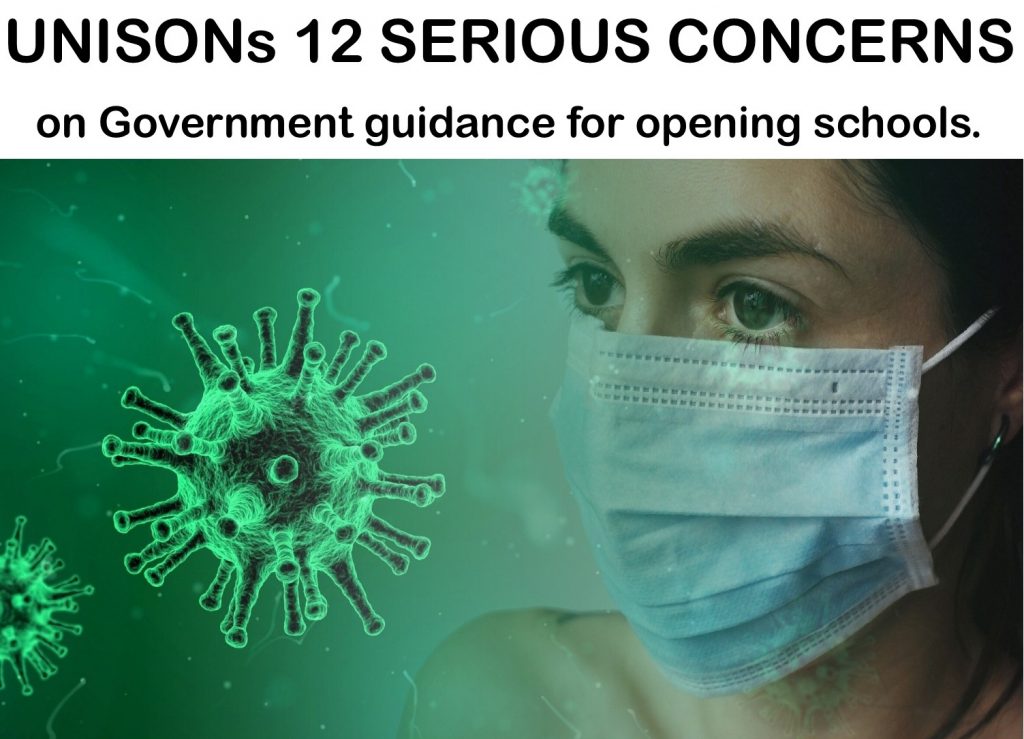12 Key issues of concern for UNISON on re-opening of Schools.

12 Key issues of concern for UNISON
1. The guidance restates the DfE‟s blanket line that scientific evidence “indicates” that school staff do not need PPE – what exactly is the scientific evidence which the DfE referring to? Will they publish this scientific evidence in full?
2. Risk assessments should be carried out for staff as well as for pupils. Local unions and health and safety representatives can add help and expertise to this process and should be fully involved.
3. The onus of the guidance unreasonably places pressure and the risk onto members of staff.
4. It will be impossible to provide the care that some children and young people need without close hands-on contact. Risk assessments need to be carried out and the appropriate PPE supplied in these circumstances.
5. The guidance states PPE is only needed in residential care if pupils develop symptoms. No account is taken of the hazards faced by school staff in terms of spitting, scratching or biting, exposure to other bodily fluids or when performing clinical procedures.
6. There is no reference to the safe disposal of waste or PPE including masks and gloves.
7. The guidance rightly highlights the paramount necessity of strict hygiene, but does not mention soap or the provision of hand sanitiser. UNISON members have raised concerns about lack of soap and having to bring their own sanitiser to work. UNISON has already raised concerns with the DfE over previous guidance suggesting some cleaning items may be rationed.
8. There is no recognition of the complexity of the issues being faced by schools with vulnerable young people – for instance what about the risk of children attending who live in crowded accommodation either in a hostel, B&B or where a large family are sharing?
9. The guidance recognises that classes should be kept to small sizes but there is no definition of what a small size is. What happens if there is an outbreak and it leads to staff absences? For pupils with SEND there may be a one to one ratio. It is common practice in SEND settings to have 8-10 students to a ratio of 5 staff.
10. The guidance recommends that soft or cuddly toys are not to be shared by students – how is this to be managed in a SEND or early years environment?
11. Social distancing is impossible to fully maintain in schools. There is no reference to the built environments that schools work in. Some schools are small with narrow corridors and passage ways.
12. Any redeployment of staff across special schools will be unsettling for the pupils who are familiar with individual teachers/teaching assistants/ learning support assistants. It could also add to the risk of spreading the virus.
Recommendation UNISON recommends that the Government’s advice is urgently revised to take full account of the needs of pupils and staff, including realistic expectations of what is achievable. It should also take into account the duty of care that the DfE and schools have to their pupils, staff and the communities in which they operate. Ofsted have identified sufficient risk to issue their inspectors with PPE in order to safely undertake emergency inspections. PPE is vital for staff who are working on the front line – without the undertaking of risk assessments for staff and the appropriate provision of PPE then some schools could be unsafe for staff, pupils and the wider community.
To read full statement click on link below
2020.04.21. UNISON-response-to-DfE-guidance-on-SEND-risk-assessment

